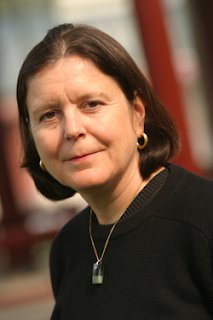Karin Tanabe is the author of the new novel The Diplomat's Daughter, which focuses on the daughter of a Japanese diplomat during World War II. Tanabe's other novels include The Gilded Years and The Price of Inheritance, and her work has appeared in a variety of publications, including The Washington Post and the Miami Herald. She lives in Washington, D.C.
Q:
Your new novel features three main characters, two of whom are men. What was it
like to write from a male perspective this time?
A:
I knew I wanted Emi to be the object of two men’s affections when I started to
write, but I wasn’t sold on also writing the male perspective, especially
twice!
But
in the end, I decided I wanted to take the book around the world, and the only
good way to do that was to also show Christian and Leo’s stories up close and
personal. Christian and Leo both experience the violence of war very
differently than Emi, and I liked being able to reveal what each gender went
through.
In
the end, I really enjoyed writing from the male perspective, and would
definitely be open to doing it again!
Q:
The novel includes scenes set during the World War II era in Europe, Asia, and
the United States, which must have involved a great deal of research. Can you
say something about how you researched the novel, and did you learn anything
that particularly surprised you?
A:
The research was certainly daunting at times, but also one of the most
enjoyable parts of the process. My research really started with the internment
camps here in the U.S., but spun out from there when I discovered personal
connections to what I was writing about.
I
was given an unpublished book written by a woman who was on a repatriation ship
from Japan back to the U.S., and also got to chat with a family friend who
lived in the mountain town of Karuizawa, Japan during the war. So a lot of my
research really felt like I was capturing these little known stories and I
think that helped make the book unique.
What
surprised me the most was the town I just mentioned, Karuizawa. During the war
both Nazis and Jews lived there in peace. Certainly a very uncommon place that
World War II buffs should know about.
Q:
The novel alternates between the perspectives of the three characters. Did you
write the chapters in the order in which they appear, or did you focus on one
at a time as you wrote?
A:
For the most part, I wrote one character at a time and then broke up the
narratives, but I would switch between them every couple chapters so that the
flow wasn’t off too much.
I
definitely felt like I had different writing voices for each character, so it
was important to stay with one for a while. Alternating chapters certainly is
intimidating, but I learned that it’s also a fun challenge for a writer.
Q:
Did you know how this novel would end before you started writing, or did you
change things around?
A:
I changed things around quite a bit. With a war novel, there is definitely
going to be death, but I killed off too many people in my first couple drafts!
The fun thing about being a writer is that I was able to bring them right back
to life.
And
while I did outline, at first the book was only going to take place in America,
and in the end I moved it all over the world because the more I researched, the
more places I wanted to include in the story.
Q:
What are you working on now?
A:
I’m only in the research phase of my next books right now, but I think I want
to stick to historical fiction for book five. French Indochina during the ‘20s
and ‘30s really interests me.
Q:
Anything else we should know?
A:
In the afterword of The Diplomat’s Daughter, I list many of the books—most of
them memoirs—that helped me with my research. If unknown World War II stories
interest you, I highly recommend you take a look!
--Interview with Deborah Kalb. For a previous Q&A with Karin Tanabe, please click here.





























